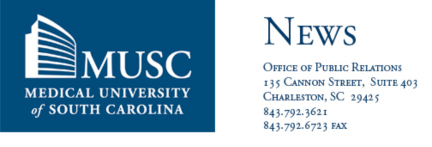
April 3, 2012
CHARLESTON -- Researchers at the Medical University of South Carolina, the University of California, San Diego, and American Life Science Pharmaceuticals of San Diego have validated gene cathepsin B (CatB) as a target for improving memory deficits and reducing Alzheimer’s Disease (AD) in animal models representative of most AD patients. The study has been published in the online edition of the Journal of Alzheimer’s Disease (Vol. 29, Number 4).
Lead investigator Mark S. Kindy, Ph.D., professor of Neurosciences of the MUSC College of Medicine and career research scientist at the Ralph H. Johnson VA Medical Center in Charleston, SC, feels the study is important because it could lead to new treatments for improving memory deficits of AD patients. According to the Alzheimer’s Association, AD is a degenerative and ultimately fatal disorder affecting as many as 5.3 million Americans and an estimated 80,000 South Carolinians.
Another gene, BACE1, has long been thought to be a cause of AD because deleting BACE1 from animal models reduces brain plaque, which is the substance responsible for some AD symptoms. However, deleting the BACE1 gene was reported to make memory deficits significantly worse in animal models.
In the current study, the researchers show that deleting CatB in mouse models improves memory deficits and also reduces plaque.
Co-authors of the study were Gregory Hook, Ph.D., of American Life Science Pharmaceuticals in San Diego, and Vivian Hook, Ph.D., of the UCSD, Jin Yu, M.D., and Hong Zhu, M.D., MUSC; and Salim S. El-Amouri, Ph.D., Cincinnati Children’s Hospital Medical Center, University of Cincinnati.
The study was supported in part by grants from the National Institute of Aging of the National Institutes of Health, the Alzheimer’s Drug Discovery Foundation and the Alzheimer’s Association.
About MUSC
Founded in 1824 in Charleston, The Medical University of South Carolina is the oldest medical school in the South. Today, MUSC continues the tradition of excellence in education, research, and patient care. MUSC educates and trains more than 3,000 students and residents, and has nearly 11,000 employees, including approximately 1,500 faculty members. As the largest non-federal employer in Charleston, the university and its affiliates have collective annual budgets in excess of $1.7 billion. MUSC operates a 750-bed medical center, which includes a nationally recognized Children's Hospital, the Ashley River Tower (cardiovascular, digestive disease, and surgical oncology), and a leading Institute of Psychiatry. For more information on academic information or clinical services, visit www.musc.edu or www.muschealth.com.
#####